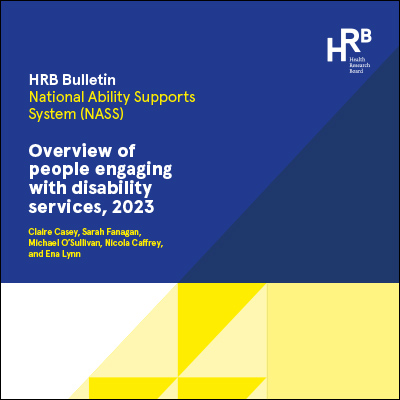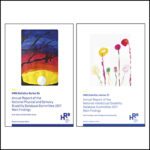Disability Services – HRB reports latest figures on current use and future demand
4 min read - 12 Jun 2024

Findings highlight a growing need for residential care and the ageing profile of carers. A new Health Research Board (HRB) report on disability services provides a picture of the services people receive* as well as the services they need, now or in the next five years.
Looking at the most frequently reported primary disability type among adults engaging with disability services; 6 in 10 adults had an intellectual disability (ID), almost 2 in 10 had a neurological disability, and 1 in 10 were Autistic.
More than 14,000 people reported having a primary carer. Among carers, more than 4 in 10 were aged 60 years or over; with six-in-ten in their 60s, three-in-ten in their 70s, and one-in-ten in their 80s.
A total of 7,799 adults currently live in a residential service. However, 1,932 adults require residential care now, or in the next five years and 771 of these adults are living with ageing carers.
Commenting on the findings, HRB Chief Executive Dr Mairéad O’Driscoll said;
“Through this report we create a better understanding of how the needs of people living with a disability and their carers change over time, which can be used to plan future allocation of resources and services.”
Ms Sarah Fanagan, Research Officer at the Health Research Board said;
“This HRB report highlights the growing demand for residential services among adults, which are needed, in particular, due to the ageing profile of carers. We found that 7 in 10 adults who require residential care had an immediate need for it, and most of this group had a moderate, severe or profound intellectual disability.”
A total of 3,142 adults receive overnight respite with a small number of adults receiving this service at least five nights a week. Meanwhile,1,119 adults require overnight respite now, or in the next five years.
According to Ms Fanagan, “Overnight respite is a key service which provides a positive experience for the person with a disability and supports families and caregivers. The fact some adults are receiving at least five nights respite points again to the immediate need that some have for residential care.”
Current service provision
- 7,892 people live in residential care; the majority (99%, 7,799) were adults.
- 3,954 people accessed 108,895 nights of respite; the majority (79%, 3,142) were adults.
- 4,899 people received home support.
- 1,814 people had a personal assistant (PA).
- 19,453 adults accessed day services, mainly a day programme (17,752, 90%).
- Over half (53%, 16,705) of adults received at least one specialist support.
Future need 2023-2028
- 1,952 people require a residential service of which 7 in 10 are required immediately.
- 1,212 people require overnight respite.
- 495 people require home support.
- 199 people require a PA.
- 3,119 people require a day service – data provided by the HSE National Day Service Database.
- 3,110 adults require at least one specialist support such as physiotherapy, occupational therapy, speech and language therapy.
* This report does not capture data on waiting lists.
**The report focuses on data about adults receiving any HSE funded disability services and children receiving residential, respite, home support and/or specialised support services from dedicated organisations. It does not include data on children in receipt of multidisciplinary supports through HSE Children’s Disability Network Teams (CDNTs). It is hoped that NASS will have a more complete picture of children accessing all HSE funded disability services, including CDNTs for 2024.
ENDS
Download a copy of the full report and infographics here. View video with Irish Sign Language (ISL) here
Tá an preasráiteas tríd gaeilge ar fail anseo.
To organise interviews with experts, please contact: Suzanne Kenny, Communications Officer, Health Research Board
m +353 85 8500494 e skenny@hrb.ie
NOTES TO EDITORS
The Health Research Board (HRB) is Ireland’s lead funding agency supporting innovative health research and delivering data and evidence that improves people’s health and patient care. We are committed to putting people first, and ensuring data and evidence are used in policy and practice to overcome health challenges, advance health systems, and benefit society and the economy.
The National Ability Supports System (NASS) is a national database which records information about disability services that people with complex needs use and/or require such as, residential services, respite care, day services and specialist supports, for example occupational therapy or physiotherapy. The purpose of NASS is to gather information from service providers to aid the planning, development, and organisation of HSE funded disability services. A person is eligible to be registered on NASS if they receive or require (either currently or within the next five years) a HSE funded disability service as identified by their service provider.
Data is provided to NASS by service providers who provide disability services to people in Ireland. Service providers are asked to ‘review’ NASS records for each of their service users once a year to ensure information is accurate for each reporting year.
4 min read - 12 Jun 2024
